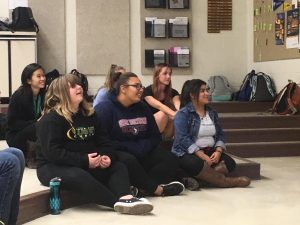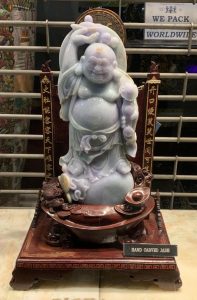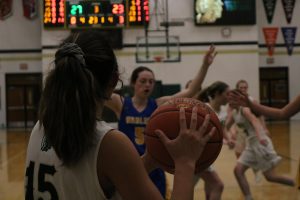Stress for success
Every year in mid-October, high school students from all over Iowa compete for a spot in the prestigious All-state music festival. Here are insights from participating West students.
Every year in mid-October, high school students from all over Iowa compete for a spot in the prestigious All-state music festival. Here are insights from participating West students.
For those unfamiliar with the All-state process, there are three groups that people can try out for: choir, orchestra and band. This is a rigorous process, and merely a small percentage of people make it. There is lots of hard work that people have put behind their auditions, and it can be disappointing to many if they don’t get in. However, for Sanya Sami ’19– along with many others– the process is more important than the payoff.
“I just enjoy the turnout, and I improve a lot from it, too,” Sami said. “I like looking back in the future and seeing my improvement.”
I like looking back in the future and seeing my improvement.
— Sanya Sami
Fellow violinists Julie Xian ‘19 and Lily Meng ‘19 coincide with Sami. None of them had gotten in before, but they were confident and knew their music well. Stress, however, was a factor that had a major role in students’ All-state preparation. Every student involved said the stress contributes to their eventual success, pushing them and making them more determined.
“I don’t think the process is enjoyable,” Xian said. “I think the things mounting up to auditions and getting in is super, […] something you don’t want to do, but it’s something you have to.”
None of these three girls had gotten into All-state before, and were hoping to be accepted. Once results were ready, everyone in the main area crowded around to see the results, hovering and murmuring as the list unfolded.
In orchestra and band, people have individual auditions on their instrument. Choir, however, has students try out in quartets, and later get individually selected. 11 out of 28 West High students were accepted this year. Each quartet is composed of SATB, and practice starts the week before school. Joseph Verry ‘18 elaborates on the process.
“We go to a camp and learn all the material at once, then keep practicing it but as a solo. A month later, we audition to get into our quartets, and after that we practice together for about a month and a half. [The choir directors] sort us based on how we do in different areas.”
Maddie Moriyama ‘18 said that West sorts their quartets in a fairer way than many high schools.
“Some schools do ‘loading’ where they put all the best people in one or two quartets and throw everyone else in the rest, but Mr. Haas wants everyone to succeed, so we sort groups based on our personal strengths and weaknesses. Like, if you struggle with pitch you’ll be in a group with someone who’s good at pitch.”
Similarly to the orchestra members, these four vocalists agree that there is lots of pressure involved in preparation. Despite this, they think they did well, and felt comfortable and relaxed during the initial auditions.
“It’s like a mind game throughout the entire process. We all know that we know [the material], it’s just a matter of being able to trust ourselves and trust what we do,” said Ella Schmitz ‘18.
All-state adversaries endure a long process filled with pressure, practice and persistence… but what about the administrators? Carl Collins is a band director at North Scott High School, and the SEIBA (Southeast Iowa Bandmasters Association) chair in the Concert Affairs Committee for IBA (Iowa Bandmasters Association). There are six different districts, and as a committee they come together and discuss concerns pertaining to all concert bands in Iowa.
“We mainly do things that benefit band,” Collins said. “Things like sponsorships, fundraisers, you name it. As long as it supports the band programs, we do it. That’s the fun part. On the other hand, we deal with issues that concern All-state and SEIBA, like any changes to the results or times or anything.”
Lastly, there were students that tried out for band. If you were placed first during auditions, you were eligible to perform in the orchestra, and would be moved there. Astonishing yet not shocking, almost all first chair band or orchestra members in All-state were from West High.
We all know that we know [the material], it’s just a matter of being able to trust ourselves and trust what we do.
— Ella Schmitz
Timothy “Tikki” Cui ‘21 was one among a handful of freshmen that went to Washington for auditions. He had high expectations for himself, along with vigor. Cui has been inspired by Bart Yates, with whom he takes private lessons, and has been participating in honor bands for a year.
“I was gonna do SEIBA in 7th grade but I wasn’t prepared enough and so I didn’t get in, but then I practiced more and got better then got in during 8th grade as fifth chair. It was a really fun experience.” Cui said. “I’m happy with what I got this year but I want to get a better score next time.”
Since All-staters have been preparing for so long themselves, they have helpful advice for other possible contenders.
“Always work hard because you never know what minute could be the difference between you and someone else,” said Cui. “Just hope for the best but prepare for the worst.”













